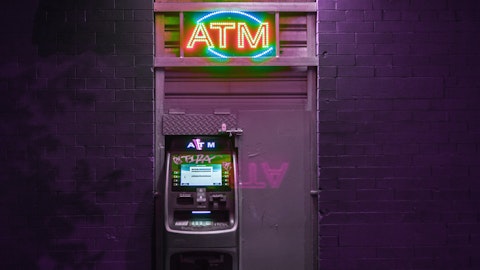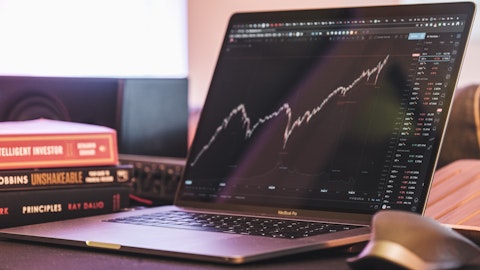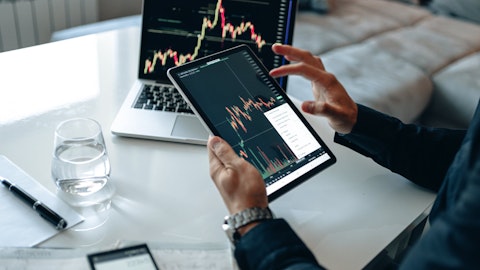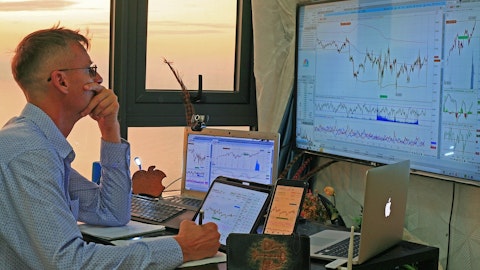Give you another example, which I just wrote about. Silver, you want solar panels, you got to have silver. That’s what goes in solar panel. I think it’s something like 32 grams of silver and solar panel, something like that. Well, but you can’t expand silver production because to expand silver production, you have to expand gold production because that’s where silver is. It’s co-located with gold. So but your environmental restrictions on doing more mining because it damages the environment. So when you need the silver to save the environment, but you can’t produce the silver because it damages the environment. So that’s why we don’t — one of the many reasons we don’t have a lot of solar panels and apart from the intermittency problem. You can’t get the silver and you can’t get the right away for the transmission line without spending unimaginable amounts of money.
So we are where we are. So I don’t really worry about stuff like that.
Therese Byars: Last question. There appears to be a small reporting difference in FRMO’s held Bitcoin between the most recent quarterly report and the less formal FRMO exposure to crypto February 29, 2024, document that was also recently published to the company website. The fiscal year 2024 third quarter report shows that FRMO held 158 units of Bitcoin as of February 29, 2024, all the FRMO exposure to crypto as of that date document reports 155.69 directly held units as of the same date. This may seem like an insignificant this difference, but I’m asking regardless, it’s only to get a better understanding of how the company is reporting or measuring these figures. Could management explain what accounts for this difference?
Murray Stahl: Okay. I can’t explain what accounts for difference. The reason is I don’t personally calculate number. But, Therese, I believe you’re in charge of the people who calculate number, so maybe you can explain the difference.
Therese Byars: Thank you for that confidence. I don’t feel that my accounting skills are strong enough to account for that difference than I didn’t. So I think —
Murray Stahl: So why don’t you just dig in. And since we don’t have the information right now, rather than just coming extemporaneously, why don’t we actually have someone look into that discrepancy? People actually calculate the number and get a report back and rather than speculate on what the differential might be. Obviously, I don’t calculate these figures personally. And I don’t think anybody would want me to calculate the figures, number one. And number two, if I did calculate the figures, I’ve been an awful lot of trouble because I’m not supposed to calculating figures like that because I am a conflicted person. So don’t let me calculate figures like that. I have to rely on other people. And other people, just like myself, we’re not perfect. And if something wrong, we just don’t know what it is. So we’ll have to figure it out.
Therese Byars: I’m sure that I think the answer is simple, and I believe it’s been asked before. So I will get the answer and slip it into the transcript when we — before we publish it. Okay.
Murray Stahl: Okay. Perfect.
Therese Byars: So that was the last question. So we are at the end of this conference call.
Steven Bregman: I don’t think it was, Therese. Unless you skipped it deliberately, I don’t think you did. There was a question — there was a question which has a certain interesting flavor to it. This is the last one. Does Winland CEO, Matthew Houk, a Horizon Kinetics employee, own his stake in the company for himself or beneficially for Horizon Kinetics. In either case, could management give us some color as to how Mr. Houk I’m going to insert my own phraseology — exactly how did Mr. Houk come to own such a large stake in Winland?
Murray Stahl: Okay. Well, to begin with he bought the shares for himself. And when he bought them, FRMO had no interest in buying any shares in Winland because as Winland was originally and still is, to a small degree, a sensor company, basically make sensors. They measure temperature, humidity, air pressure, air quality, things like that. It’s a nice little business, but it’s a very competitive business. It’s very hard to develop new sensors. It’s a limited market, if you can go up against the giants and it’s a small company. So I just noticed that some years after he acquired it, and I thought that Winland would be suitable for FRMO, so I approached him. And were there any shares available for sale other than the few hundred shares that trade every day in the stock market.
And there were some shares available for sale. Trouble is when the blocks got away from me, somebody else bought it? I have no idea who it was. And I was able to buy block from a pre-existing shareholder. He has held the shares since the beginning.
Steven Bregman: That was his, I’m sorry, that was his first, as I understand his first entrepreneurial foray, and he and one or two other people did what they read about ever since they were young, which is the — they found that it was an undervalued company with a lot of cash and thought they could improve it. And they went and got themselves on the Board. And at a time, I believe, I remember a conversation. Matt came in to my office and asked me if I would be upset if he be a problem if you engage in such an activity and maybe it might take some of his time and I think Murray is aware of that too. And we just said, no, go by all needs. We’re delighted that you want to get engaged and use your skills and test yourself.
Murray Stahl: Yes. So as I recall, it was a couple of years before it caught my attention. So any other questions from anyone?
Therese Byars: Those were the last one.
Murray Stahl: Okay. In that case, it just remains me to thank everybody for listening to us and participating and it’s a very thorough and rigorous questioning, which we definitely enjoy. And of course, we’re going to reprise this in about 90 days. And in the interim, you think of anything, the courtesy you’d ask right now, please contact us, we’ll get you an answer. So until about 90 days, we’ll see you again. And I’ll just sign off right now and thanks so much for joining the call.
Therese Byars: This ends the conference call. You may now. Steve, did you have something?
Steven Bregman: No. I said goodbye.
Therese Byars: Okay. You may now disconnect.
Murray Stahl: Okay. Thanks, everybody. Bye-bye.
End of Q&A:
Follow Frmo Corp (OTC:FRMO)
Follow Frmo Corp (OTC:FRMO)
Receive real-time insider trading and news alerts





